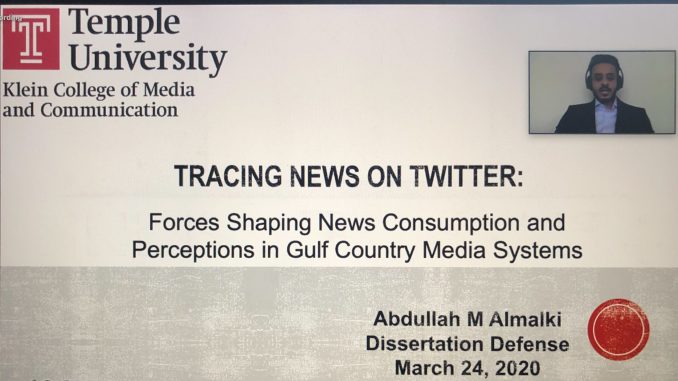
Coming from a big Saudi Arabian family of educators, Abdullah Almalki is the first member to get a Ph.D. degree and study abroad.
It was his mother’s wish for him to get this degree, as she was the one who encouraged and supported him in every step of this experience, said Almalki, who has just finished his fourth year of his doctorate in media and communication and is now planning to go back home.
“She wanted to make sure I received as much education as possible,” he added. “…We talk on the phone every single day and sometimes twice or three times a day, so she can check up on me to make sure everything is going as planned.”
On March 24, Almalki presented his dissertation about the forces shaping news consumption in Arab states of the Persian Gulf in the Middle East, and their media systems via Zoom, a video conference platform, to about 15 committee members, like media and political science professors and among them was his advisor Logan Molyneux.
He was the first candidate from Klein College of Media and Communication to present his dissertation online, after the university transitioned to online classes on March 15 due to the COVID-19 outbreak, according to Patrick Murphy, associate dean for research and graduate studies at Klein College.
“I am not really good at making video calls, and I was a bit scared of that,” Almalki said. “I was also afraid of the internet connection because I have experienced a few prpoblems in the past, so I was afraid that something like this could happen to me while I was presenting my dissertation.”
Dissertation defenses usually happen after students submit their thesis to the thesis committee. In the assigned date, the students have the opportunity to defend and argue about their work. The thesis defense is designed so that faculty members can ask questions and make sure students actually understand their field and focus area, according to GradSchoolHub.
Living in one of them, Almalki decided to do his dissertation about the Gulf countries, including Kuwait and the United Arab Emirates. The lack of media research in the Gulf region, especially when investigating news audiences’ consumption habits, and the connection between media structure and the public, intrigued him to study this topic. His dissertation aims to fill this gap in media systems research by exploring the news consumption of people and their behavior, especially in developing societies, he added.
Because he can only present his dissertation once, doing it online was disheartening, Almalki said. The advantage of this was that his family from Saudi Arabia, a few of his close friends from the United States, Saudi Arabia and Kuwait could attend.
“The good thing about it actually was that my family was able to watch my defense,” he added. “If I had to defend my presentation in person, they would not be able to attend that.”
Nancy Morris, a media studies and production professor and one of Almalki’s first professors at Temple, who attended the defense, thought he did a great job organizing his work and presenting it, she said.
“It is a very interesting topic,” she said. “I think it is good for those of us in the United States to understand more about the rest of the world.”
Molyneux was impressed with Almalki’s perseverance throughout the process. Although she had asked him to do large changes to his work, he did not get discouraged, he said.
“For instance, we went through several iterations of his hypotheses and research questions. The first version missed the mark quite a bit, and I was worried that when I told him so, he’d be discouraged,” Molyneux added. “Instead, he made the revisions I asked for cheerfully, and then made further revisions that were needed to bring the project up to par.”
For his next steps, Almalki said he will be working as a professor at a Saudi university once he returns to his country. He said his passion for teaching goes back to his early years when his parents, especially his mother, encouraged and advised him to respect teachers no matter what subject they teach.
“They always explained the significant role that teachers play in our life and society,” he added. “They kept telling me that teachers are like messengers and you have to respect them to get the message.”
Although he is excited to go back home after the pandemic, Almalki is very grateful for the opportunity his school and professors gave him, he said.
“Temple was one of the best decisions I have ever made,” he said. “If I went back in time, I would choose Temple again.”


Be the first to comment